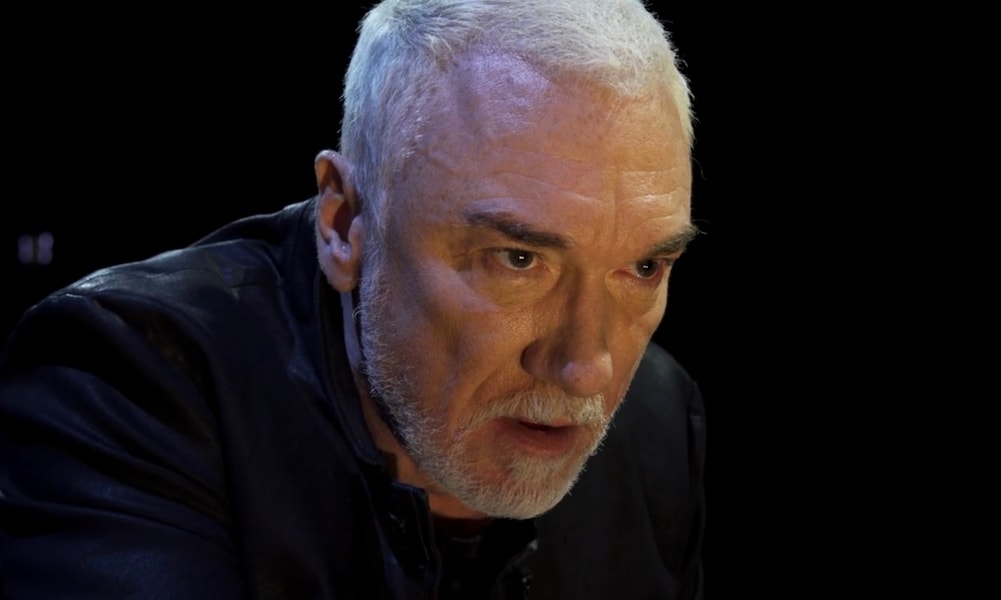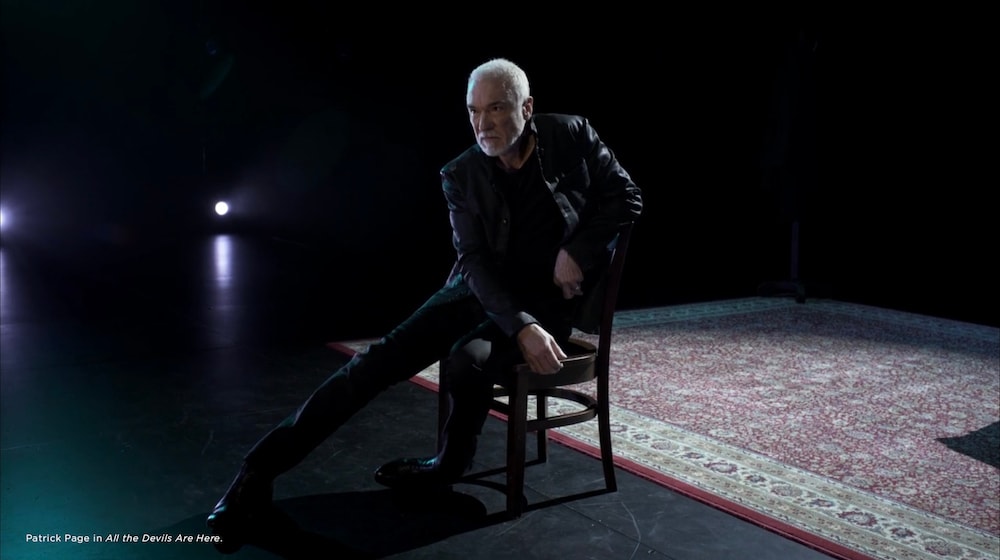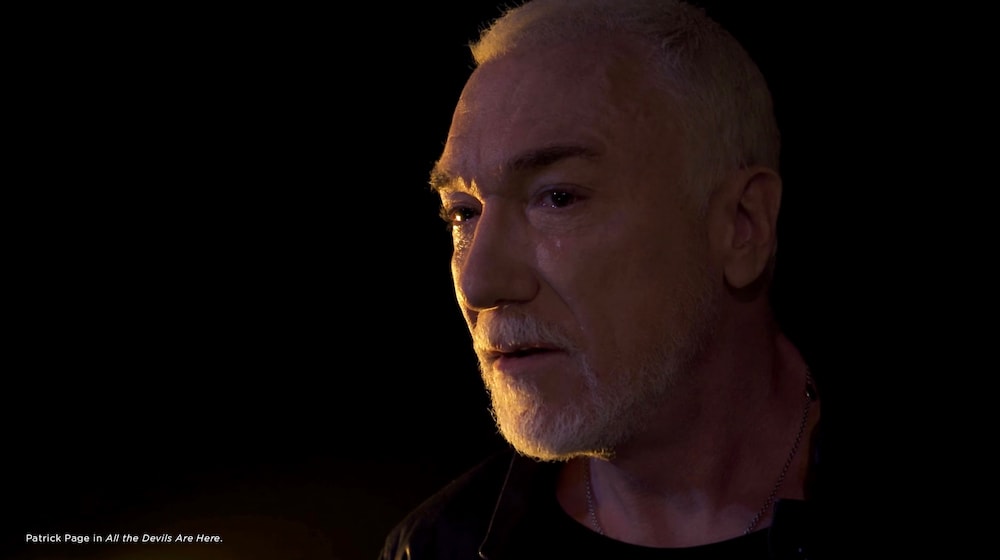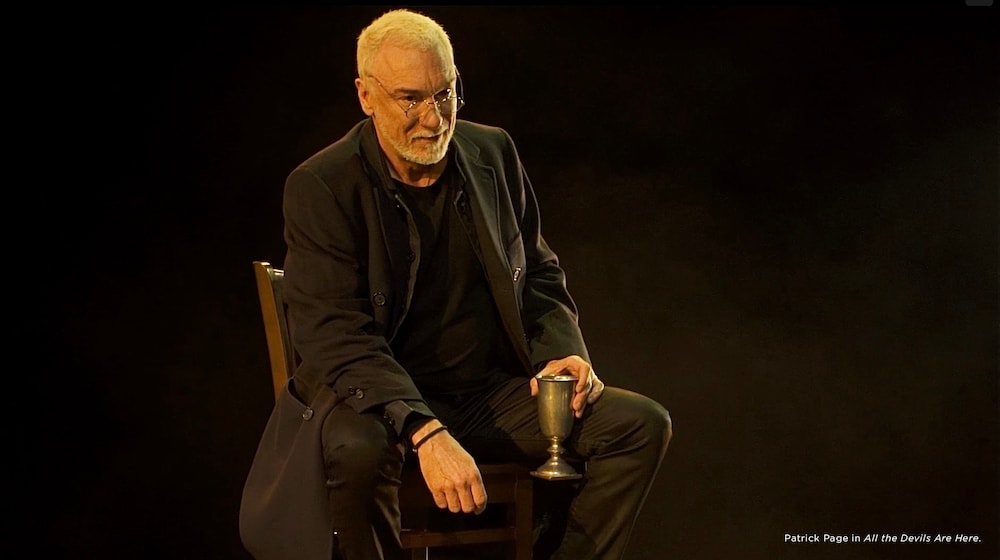“This rough magic I here abjure.” This phrase, from Prospero’s farewell in The Tempest, is among the most exquisite in Shakespeare. In All the Devils Are Here: How Shakespeare Invented the Villain, Shakespeare Theatre Company Affiliated Artist Patrick Page brings us a different kind of magic: the artistry of an actor who has studied his characters deeply and understands them in every detail. We will never perceive them in quite the same way again.
All the Devils Are Here, STC’s first online-only production, is adapted from the works of Shakespeare, written by and starring Page. The subject is the evolution of Shakespeare’s villains, from stock characters to multifaceted human beings. As modern exemplars of the Bard’s creations, Page suggests Claire Underwood (Robin Wright) in House of Cards as Lady Macbeth, Scar in The Lion King (whom he played on Broadway) as Claudius, and Walter White (Bryan Cranston) in Breaking Bad as Macbeth.

Praised for his portrayal of nature’s villains, Page was nominated for a Tony Award in 2019 for his role as Hades in Hadestown. Other Broadway credits include Julius Caesar (with Denzel Washington), Saint Joan, Casa Valentina, Spring Awakening, Cyrano de Bergerac, The Lion King, and Dr. Seuss’ How the Grinch Stole Christmas! The Musical.
At STC, he received a Helen Hayes Award for playing Iago to Avery Brooks’s Othello. Other STC roles include Macbeth, Coriolanus, Claudius in Hamlet, and Prospero in The Tempest.
Page begins with the terrifying words of Lady Macbeth:
“Come, you spirits that tend on mortal thoughts, unsex me here, and fill me from the crown to the toe top-full of direst cruelty!” As he whispers, he sets the tone for his exploration of uncanny villainy, the lust for revenge, and the ice-cold ground zero of evil.
Shakespeare, Page suggests, may have seen medieval morality plays as a young boy, encountering the personification of sin, Vice, who is wicked, comic, and inclined to asides.
Page’s Richard III, like Vice, is given to monologues with a humorous edge. He decries his disability, and seeks revenge for this cruel injury, inflicted upon him at birth. He hisses and growls, telling us that he was born with teeth, to bite like a dog.

Shakespeare’s alleged youthful poaching of a deer, his rivalry with Christopher Marlowe, and his love for the Dark Lady are all touched upon. And at every point, Page skillfully sets Shakespeare’s words in context, reminding us that the Elizabethan audience was largely anti-Semitic and full of arbitrary prejudices. Shakespeare’s “hath not a Jew eyes?” speech, one of his most famous, brings home to us the extent of Shylock’s wrongs. Page’s version of this monologue is a marvel; his Shylock is bitter, self-reflective, and full of rage, expressed and otherwise. Shakespeare continues to destroy stereotypes as his analysis of evil ripens. The white Iago is a sociopath, while the Moor Othello has courage, exceptional ability, and a trusting nature.

In the unforgettable scene in which Falstaff plays Prince Hal’s father, Page finds multiple levels of meaning in the relationship between Falstaff and Hal. He ends with the prophetic, moving plea: “Banish plump Jack, and banish all the world.”
Page’s Malvolio in Twelfth Night is a masterpiece of vanity, ambition, and maniacal foolishness. Malvolio’s need for revenge, like Shylock’s is based on humiliation.
Macbeth’s “Is this a dagger which I see before me” speech echoes Lady Macbeth’s in the beginning.

In The Magic Mountain, Thomas Mann said, “Tolerance becomes a crime when applied to evil.”
Prospero in The Tempest, who has his own reasons for seeking revenge, brings us not tolerance but forgiveness. His enemies are at last under his power, and they are suffering. The delicate spirit, Ariel, tells him that his emotions would be touched by their anguish. “Dost thou think so, spirit?” says Prospero. “Mine would, sir, were I human,” replies Ariel.
Fittingly, it is a spirit who must inspire the human to forgive. And we now grasp, after all we have seen, the value of that forgiveness. We understand Prospero more completely now. We know what it has cost him.
Running Time: About 80 minutes, with no intermission.
All the Devils Are Here: How Shakespeare Invented the Villain is now available for viewing online through July 28, 2021. Tickets, priced at $25 for this limited engagement, may be purchased online. (The streaming link is available for 72 hours after purchase. Please wait to purchase until ready to watch.)
Credits
Adapted from the works of William Shakespeare
Written and performed by Patrick Page
Film Director: Alan Paul
Video Production: JoKno Media
Director of Photography: Joey Ruffini
Lighting: Elizabeth A. Coco
Additional Sound Design: Gordon Nimmo-Smith
For This Production
Costume Director: Barbara Hicks
Properties Director: Chris Young
SEE ALSO: Patrick Page to bare the Bard’s bad guys, onstage at Shakespeare Theatre Company




